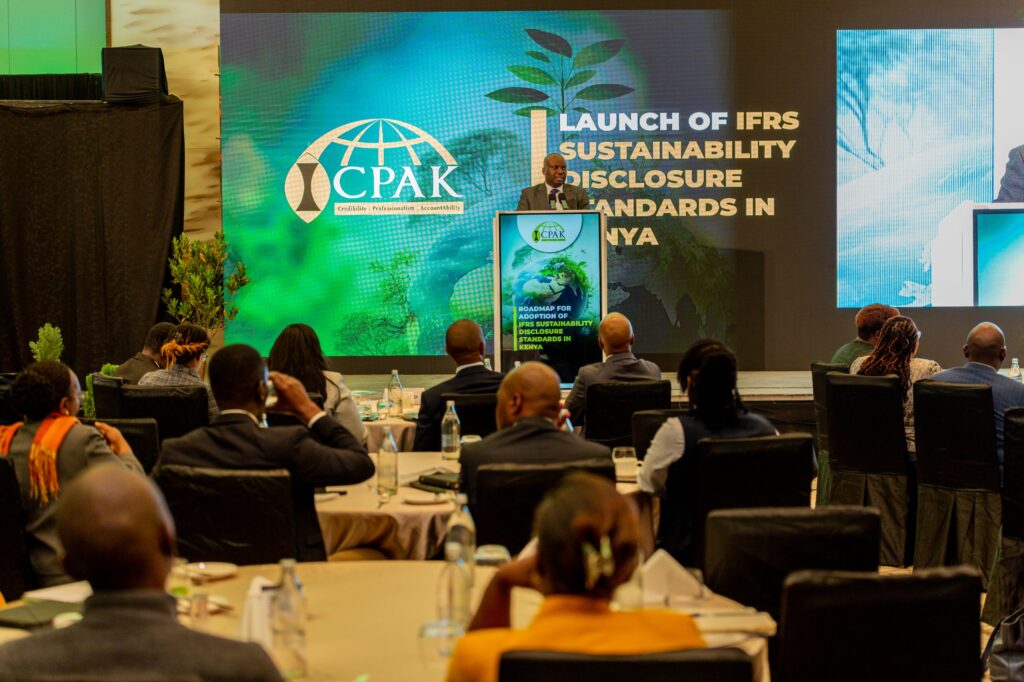- Mandatory IFRS sustainability reporting in Kenya will begin from 2027 to 2029.
- For the SMEs that are non-public interest entities, mandatory onboarding will begin on January 1, 2029.
- This unified framework aims to provide consistent and comparable information, benefiting investors and fostering transparency across Kenyan markets.
Kenyan firms will from 2027 be able to directly compare the performance of their Environmental, Social and Governance (ESG) initiatives with other companies globally as the country moves to adopt reporting under a common standard worldwide.
The country has initiated a plan to adopt the sustainability reporting under the International Financial Reporting Standards two (IFRS S2), designed to make public disclosures uniform, transparent, and easy to compare globally.
The Institute of Certified Public Accountants of Kenya (ICPAK) has set January 1, 2027, as the commencement date for the mandatory adoption of the sustainability reporting under the IFRS.
Under the plan, in phase one that began in January 2024, all organizations are required to adopt the sustainability reporting standards voluntarily. While in phase two, which is the mandatory adoption is set to kick in from January 1, 2027 for public interest entities (PIEs), large non-PIEs will have an extra one year to be on boarded and will commence in 2028.
Read also: Kenya’s Capital Markets Authority eyeing global standards with key reforms
Regulatory and transparency requirements
Public interest entities (PIEs) are organizations that have significant influence on the public and economy due to their size, complexity, or nature of operations and are therefore subject to heightened regulatory and transparency requirements.
PIEs typically include companies whose failure or misconduct could disrupt the financial system or harm large groups of stakeholders, including the public.
ICPAK Chairman Philip Kakai said that the adoption of the IFRS Sustainability Disclosure Standards in a phased approach will ensure a smooth transition for organisations of all sizes. For the SMEs that are non-public interest entities, mandatory onboarding will begin on January 1, 2029.
However, phase three, whicht will incorporate timelines for Public Sector Entities is yet to be determined by ICPAK. “This approach will allow organisations to build capacity, gather necessary data, and align their internal processes with the new standards,” said ICPAK Chairman Philip Kakai.
Before the adoption all organisations will undergo a readiness assessment before the initial sustainability disclosures are published.
IFRS sustainability reporting in Kenya
ICPAK Chief Executive Grace Kamau said these standards will allow investors, regulators, and other stakeholders to make better-informed decisions based on reliable and transparent sustainability information.
“As we adopt these standards, we align ourselves with global best practices that will enhance the credibility of Kenyan businesses, increase investor confidence, and support the growth of a more sustainable economy,” said Kamau.
This comes at a time when a report by the steering committee showed that 65 per cent of organisations polled don’t disclose environmentally related information to their employees.
Read also: Kenya seeks AfCFTA partnership on trade standards
Tools to measure sustainability
ICEA LION chief finance officer Zipporah Chege, who steered the committee, noted that only 14.7 per cent of organisations in Kenya have the tools to measure sustainability.
“To the regulators, this is one of the areas where we can actually support various institutions on what tools they can bring onboard to help in the adoption and execution easier,” said Chege.
According to ICPAK, as organizations worldwide grapple with fragmented sustainability reporting frameworks, Kenya’s sustainability reporting landscape is also marked by diverse initiatives lacking cohesion.
By adopting the IFRS Sustainability Disclosure Standards, ICPAK aims to provide organisations with clear guidance and frameworks to effectively monitor, manage, and disclose their sustainability impacts, along with climate risks and opportunities.
This approach will enhance comparability, eliminate fragmented reporting frameworks, and align Kenya’s reporting standards with global best practices.

Additionally, the Sustainable Finance Initiative has introduced industry principles for sustainable banking, but all this lacks a coherent approach.
Kakai noted that this patchwork of guidelines has presented a challenge for companies and investors alike, making it difficult to compare data across sectors.
“To address this, the Institute of Certified Public Accountants of Kenya (ICPAK), in partnership with the International Sustainability Standards Board (ISSB), is championing the adoption of a global baseline for sustainability-related disclosures in Kenya,” said the Chair.
This unified framework aims to provide consistent and comparable information, benefiting investors and fostering transparency across Kenyan markets.
The ICPAK-ISSB initiative seeks to align Kenya’s reporting standards with international norms, promoting sustainability practices that will enhance the comparability and reliability of ESG data, ultimately supporting more informed investment decisions.











